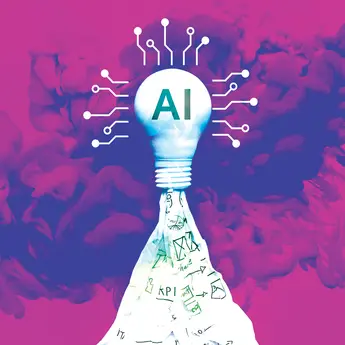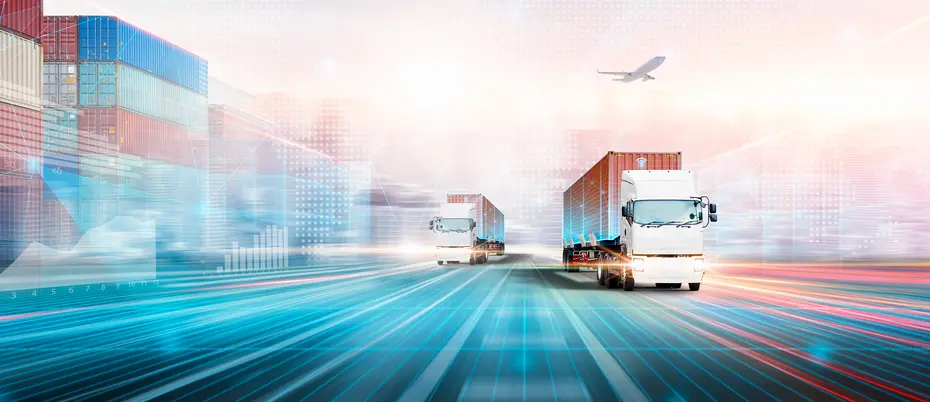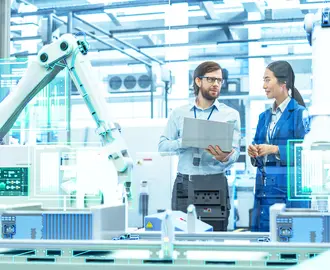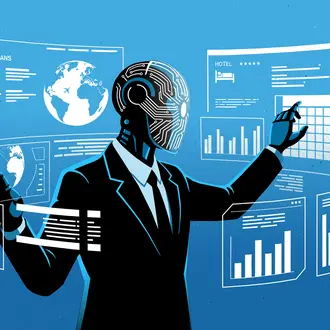What you’ll learn:
- AI is poised to reduce costs in the transportation sector, potentially augmenting or automating $65 billion worth of tasks.
- Some 1.1 million full-time transportation employees could be impacted by AI.
- Lower-skilled workers should receive additional training to stay competitive in the workforce.
Artificial intelligence is revolutionizing the transportation industry — optimizing routes, streamlining supply chains, enabling driverless trucking on long-haul routes, and more.
That means AI has significant implications for the workforce, too, with new research showing that 1.1 million full-time transportation employees will be impacted by the technology.
“AI and the Transportation Workforce,” a study by Yossi Sheffi, director of the MIT Center for Transportation & Logistics, and PhD candidate Pierre Bouquet, reveals the extent to which AI will affect jobs, tasks, and costs in that sector.
The potential for disruption “remains significant,” particularly within small and midsize enterprises that adapt to technology at a slower pace, the authors write.
In their study, Sheffi and Bouquet analyzed the evolution of the U.S. transportation workforce over the past 10 years. The researchers analyzed more than 2,000 tasks across 900 occupations and 20 industries, using a task-based framework that broke down each job into its component activities so they could assess which ones may be enhanced or replaced by AI systems.
Here are some of their findings.
AI will impact 1.1 million workers in the transportation industry
The authors found that AI can be used to accelerate at least one task in 83% of occupations. Among the jobs that are most highly exposed to AI are:
- Shipping, receiving, and inventory clerks.
- Reservation and transportation ticket agents and travel clerks.
- Cargo and freight agents and freight forwarders.
AI is poised to disproportionately impact jobs requiring cognitive skills
Many information-processing, decision-making, and quantitative tasks can be effectively replicated by AI systems, the researchers found.
Jobs demanding manual skills or physical endurance are less exposed because such abilities are harder for AI to replicate.
For example, long-haul driving may be suitable for automated trucks (in states like Texas, where it is legal), but short-haul and local deliveries are less likely to be fully automated because they require flexibility and dexterity (driving in Boston in winter, for instance).
That said, no job has all of its tasks significantly exposed to AI. “Complete automation is unlikely,” the authors write, suggesting that AI won’t fully replace workers but will make them more efficient or redefine their responsibilities as work becomes more technology-dependent.
AI has the potential to automate $65 billion worth of tasks
AI has great potential to reduce costs in the transportation sector. The sector paid out $290 billion in annual wages in 2024, and the authors estimate that AI could accelerate $65 billion of that work when done in collaboration with a human.
Examples of tasks that have been done by humans but that AI can now do include:
- Inspecting cargo to ensure that it has been properly loaded or secured.
- Reviewing documents or materials for compliance with policies or regulations.
- Navigation via routing services like Waze and Google Maps, which help optimize driving routes and delivery by predicting traffic conditions and estimating travel times.
Automating the six largest AI-exposed tasks in the sector could result in annual cost reductions between $1 billion and $4 billion, the authors estimate.
Workers with minimal education performing cognitive tasks are most exposed to AI
Transportation industry workers with only a high school diploma face the highest exposure to AI.
Approximately 28% of their jobs fall within the top quartile of AI-exposed occupations, representing around 1.1 million workers in the U. S.
“These roles typically have low barriers to entry, making them particularly vulnerable to displacement if a rise in demand does not outpace productivity gains from automation,” the authors write. Examples include:
- Clerks.
- Freight agents.
- Dispatchers.
- Recordkeepers (whose jobs are information-intensive but can easily be augmented through an AI agent).
Without new job creation or reskilling efforts, the number of workers in this segment and their wages are likely to decline, research from MIT’s David Autor and Neil Thompson has established.
Employers should train these workers for new tasks to facilitate a transition to another role that maximizes their potential, Bouquet said. These workers typically have valuable institutional knowledge that can continue to be highly beneficial to the organization. In addition, hiring externally tends to be more expensive than retraining existing employees, Bouquet noted.
“To help workers, we need to train them to use AI tools effectively so they remain competitive and upskill or reskill them for adjacent roles where their experience is valuable,” Bouquet said. This aligns with closely with the MIT CTL’s mission to leverage AI not only to improve logistics and supply chains but to enhance outcomes for workers, he said.
Yossi Sheffi is director of the MIT Center for Transportation & Logistics and an MIT professor specializing in systems optimization, risk analysis, and supply chain management. His latest book is “The Magic Conveyor Belt: Supply Chains, A.I. and the Future of Work.” Pierre Bouquet is a PhD student at the Center for Transportation & Logistics; he worked with Sheffi for his master’s thesis on the impact of AI and automation on supply chains. He is also the lead researcher/author of the paper “AI-Based Forecasting for Optimized Solar Energy Management and Smart Grid Efficiency.”

AI Executive Academy
In person at MIT Sloan
Register Now





